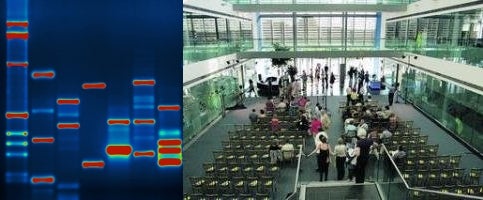UK Choir Performs Music Based on Singers’ Own Genetic Codes
There’s no doubt humans are a musical species, although whether there’s a genetic basis for our musicality is still up...

There’s no doubt humans are a musical species, although whether there’s a genetic basis for our musicality is still up for debate. A UK team put that question into literal terms Tuesday night in London.
Over the weekend, the New London Chamber Choir offered three performances of “Allele,” a 20-minute, 40-part choral work in which the members sing their own genetic codes.
The chorus of “A C T G” rises to a haunting, oddly textured crescendo; listen here.
Composer Michael Zev Gordon worked with Dr. Andrew Morley, who has been testing the genes of 250 musicians and 250 non-musicians to see if a certain gene determines musical ability.
Morley, who has sung in a choir and composed music, realized musical notes look a bit like genetic sequences. He consulted with Gordon, who viewed the genetic code as raw material that could be translated into notes, according to the BBC.
Gordon decided to assign a note to each of the four bases that make up DNA. He describes his work in a Guardian guest column published last month. He mapped a segment of a chosen polymorphism according to the “do-re-mi” scale, and added a rhythm.
“I arrived, to my surprise, at something that sounded quite like plainsong: it became the initial gesture of the piece,” he writes.
The piece begins with a single voice singing a rhythm, and then more voices join in to convey the biological idea of replication and reproduction, BBC explains. At the climax, each of the 40 singers is singing part of his or her own genetic code.
The differences are subtle enough to sound harmonious — a fitting metaphor for the genetic similarities we all share.
[via PhysOrg, BBC, Oxford Times]